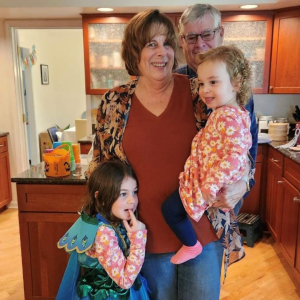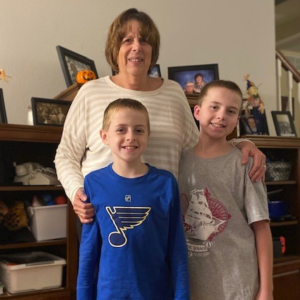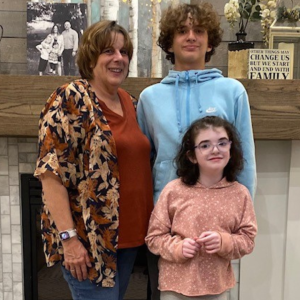Memorial Health Nurse Suffers Stroke – Receives Lifesaving Care from Her Colleagues
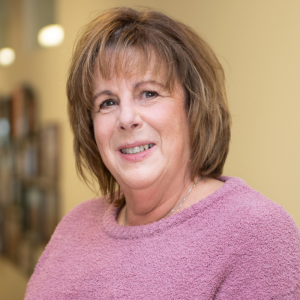
A broken ankle was bad enough, but as she sat in the waiting room at a doctor’s appointment last summer, Norby Tester had a stroke.
“I was having pain in my leg,” Norby said. “I thought I might have a blood clot, but a Doppler (ultrasound) done four days earlier was negative. I was in the waiting room with my husband, Larry, waiting for the physical therapist to come look at a scooter I was using when I just slumped over.”
The quiet waiting room at Springfield Clinic immediately sprang into action. Norby, 66, remembers hearing a code broadcast over the intercom and an ambulance being called. Fortunately, the office was right across the street from Springfield Memorial Hospital, which is an accredited Comprehensive Stroke Center, the highest designation available.
Norby was very familiar with the stroke response protocols at SMH, where she had worked as a Rapid Response registered nurse. In fact, 15 years earlier, as a 2C staff nurse, she was part of the team that first implemented the *Star 45 protocol for stroke.
That protocol enables stroke patients to be treated as quickly as possible when they arrive in the Emergency Department. When treating stroke, every second counts. Patients who receive clot-busting medication faster have a quicker recovery and experience fewer long-term effects.Norby could hear what people were saying and recalls bits and pieces as her Emergency Department co-workers came to her aid. “This is Norby? Rapid response Norby?” she recalls hearing.
The ED team immediately got Norby to Radiology for a CT scan. After reviewing the results, the recommendation was to administer Tenecteplase (TNK), a powerful blood-thinning medication used to treat a stroke caused by a blood clot. The TNK must be administered quickly after symptoms start.
After the TNK, she remembers being in the scanner for a second CT and hearing “total occlusion of the right MCA.” She knew what that meant and felt like she was facing a dire situation. But the staff told her “Norby, you’re going to be OK. Dr. Muehle is here.”
Casey Muehle, MD, a diagnostic/interventional radiologist with Springfield Clinic, headed up her thrombectomy, which is a procedure that removes a blood clot from an artery or vein. He passed a catheter through her groin artery and up through her carotid artery to her brain to retrieve the occluding clot. Blood flow was restored.
“I have worked with him for a long time and just knew he was the best,” Norby said. “I am so thankful for his expertise and skills that removed my clot and certainly initiated my amazing recovery.”
A repeat Doppler done while in the hospital showed two clots in her leg, which were determined to be the source of the stroke.
When she woke up from the procedure, she had been moved to 2C, the unit where she previously worked as a staff nurse. Former co-workers were now her caregivers.
Norby was also greeted by her family, including Larry, their three kids, her mother and her brother. They never left her alone during her hospitalization. Norby was amazed at how quickly she could get up, use the bathroom, swallow and even walk.
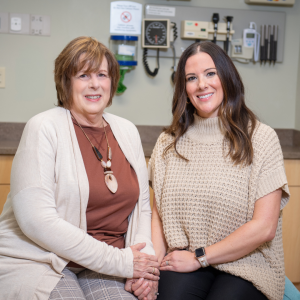
Her daughter Gina Carnduff works at Memorial Health as director of perioperative services. That day, she suddenly found herself in a completely different role – that of family member.
“I could not have asked for better care. It was exceptional,” Gina said. “My mom has worked at Memorial for 44 years, and I could not have been more proud of the organization than I was that day. They saved her life. Thanks to the extraordinary care provided, my mom is back to being a grandmother, mother, friend, aunt, mentor and nurse – we could not be more grateful.”
After just a couple of days, Norby was able to leave the hospital to continue the recovery process. She greatly appreciates the quality care she received at all levels at SMH.
“I’ve seen enough in my career to know that not everyone is as fortunate as I have been after an event like this,” she said. “I am convinced God places people where they need to be. He blessed me with being at the right place, at the right time, with the right people.”
Today, the ankle is healed, and she is enjoying line dancing again with friends at a local winery. She’s revisited bowling with her grandkids and she’s walking regularly. She plans to retire in January and looks forward to traveling more and visiting family and friends, far and near.
“Things are getting back to normal,” she said. “Every minute I get to enjoy with my family and watch my grandkids grow is the greatest gift. We cannot thank enough all those who cared for me through the stroke treatment and recovery.”
